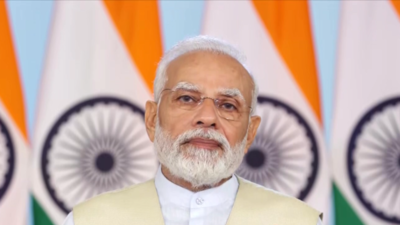- News
- India News
- Frame laws with expiry date: PM Modi
Trending
This story is from October 16, 2022
Frame laws with expiry date: PM Modi

PM Narendra Modi virtually addressing the inaugural session of the All India Conference of Law Ministers and Secretaries, in New Delhi on Saturday. (ANI photo)
Addressing a two-day meet of law ministers and law secretaries of states at Kevadia, Gujarat, the PM said complexity in laws was contributing to delay in justice delivery and imposing a high cost on citizens.

Addressing a meet of state law ministers and law secretaries on Saturday, PM Narendra Modi said obscure laws were contributing to making the legal system complex and simplifying these would make a big impact on justice delivery.
"Obscurity of law creates complexity. If law is comprehensible to the common man, it will have a different impact ... Our focus should be such that even the poor can understand the new law," he said.
Modi said some countries have the provision of deciding during the framing of a law as to how long it will remain effective. "So, in a way, the age and the expiry date of a law is determined when it is being framed. When that (stipulated) date comes, the same law is reviewed in new circumstances. In India, too, we will have to go ahead with the same spirit," he said.
The PM said in the last eight years, his government has scrapped over 1,500 old, obsolete and irrelevant laws, many of which continued from the time of
British rule.
Stressing the use of regional languages in the legal system, he said it is critical for the "ease of justice" and suggested that digital libraries of important cases of the Supreme Court and HCs will go a long way in helping the people.
"When the judicial system grows along with society, it has a natural tendency to adopt modernity. As a result, the changes that take place in society are also visible through the justice system," Modi said. "E-Courts Mission is moving fast in the country. Systems like virtual hearing and production have become a part of our legal system. E-filing of cases is also being encouraged. With the advent of 5G in the country, such systems will gain pace, and many changes are inherent."
"Delay in getting justice is one of the major challenges being faced by the people of our country ... But our judiciary is seriously working towards resolving this issue. In this 'Amrit Kaal', we will have to work together to tackle this," the PM said.
Speaking on the occasion, law minister Kiren Rijiju said: "I have been regularly interacting with the judiciary at every level and I tell them that the government will never challenge their judgments, but they should not get in the way of India's growth story ... we may be different organs of the same state, but we have to work together." The PM said alternative dispute resolution mechanisms must be promoted as these can lower the burden of courts and pendency of cases. States should study various practices prevalent in the society on dispute resolutions and see how some of them can be adopted in the legal system, he said.
He also expressed concern about the huge undertrial population in jails.
End of Article
FOLLOW US ON SOCIAL MEDIA










